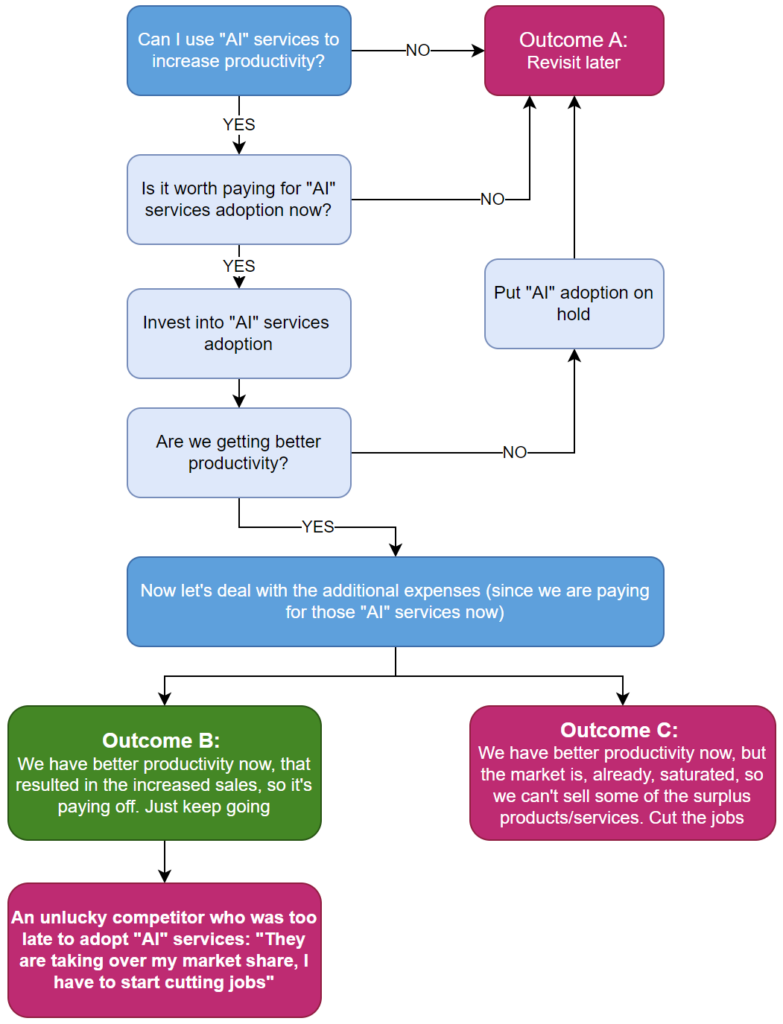I was trying to imagine how would “AI” adoption go, and, it seems, there is only one possible outcome in the long term. “AI” is there to either compliment human workers or to replace them, but, ultimately, it’s there to increase productivity in those areas where it can be adopted.
In a very limited number of cases, there is almost no limit to how far that increase can go (scientific research, perhaps).
But, for instance, say there is a car dealership. Ultimately, there are only so many cars that dealership may be able to sell or service, so, once the productivity of the sales managers / service technicians goes over the board and there is not enough work for them to do, there will be job cuts.
To a different extent, the same considerations should be applicable to most of the other jobs, right?
So, then, have a look at the diagram below. It’s my very simple “decision tree” – in the long term, there is no outcome that does not lead to job cuts. Otherwise, there would be just no reason at all to even start inventing/adopting “AI”:

That said, perhaps new jobs will show up for humans to be employed there. Or, perhaps, some jobs are not going to benefit from the “AI” for a while still. But, in the long term, increased productivity will lead to more production (by definition), so where are all those products and services going to go? And, if there is surplus, that productivity will need to be brought down, so the job cuts will follow.
I’m not an economist, but it seems common sense (though it’s not a doomsday post either, I’m quite curious to see where we all end up in a few years).
Great post, Alex.
I believe that we will most likely experience a period of very difficult disruption for potentially billions of people, and then we have to hope that our use of the technology itself will lead to a complete re-write of some very fundamental concepts, such as how we make a living. The concept of the “job” and the way that “human resources” are currently deployed will need to change. If AI helps us to achieve that, great. If not, I’m a little skeptical that we achieve it ourselves, as we do not have the best track record, historically speaking.
It is quite exciting to be living at our current time right now when we’re at the very cusp of achieving business goals using straightforward coding plus crm interface to using AI where things are not so black and white. The whole thing still seems very magical, but what it boils down to is, in order to have AI to benefit your organization, you’ll need a gigantic amount of data, train the model, and an outrageous powerful hardware to run it so we can get outcome.
How is too much fit here, but application is so wide – productivity boast is one. But it’s the exceptional data analysis where an organization can benefit from – but like you said, there is still need human to say “go”. but the insight (just like how microsoft branded its previous incarnation of data analysis) is how it’ll help organization to make informed decision that will generate the most revenue. case in point, our current project in airbnb industry – with a constantly fluctuating business model, volume of booking differs by weeks / months (hot season vs cold seasons) along with data coming from your neighborhood competition, you can vary the price point / night, to maximize revenue.. assuming of course with proper data model and training.
But what’s in store for us, as IT professionals, we’re shifting not only from code to codeless, but we should start learning and honing our skills in appropriate areas to take advantage of the technology, so we can benefit our clients.